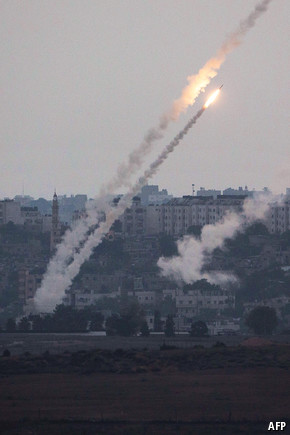UPDATES
World reacts to Hamas rejection of ceasefire
July 18, 2014 | Glen Falkenstein

International pressure has been directed at Hamas, following its rejection of a ceasefire with Israel – raising the level of international criticism and condemnation of the terrorist organisation.
On Tuesday, Prime Minister Netanyahu, backed by the Israeli Cabinet, accepted an Egyptian-brokered ceasefire agreement between Israel and Hamas. Ofir Gendelman, a spokesman for Netanyahu, announced on Twitter that “the Cabinet has decided to accept the Egyptian initiative for a ceasefire.” At 9am on Tuesday Israel halted its fire, following which, between 9am and 3pm, Hamas fired 47 rockets at Israel from Gaza, prompting Israel to resume its military response.
Hamas rejected the deal, with the al-Qassam Brigades [Hamas’ military wing] making their position unequivocally clear: “Our battle with the enemy continues and will increase in ferocity and intensity.” Reportedly, the political wing of Hamas was considering the ceasefire, while its military wing, a designated terrorist organisation in many countries including Australia, responded with rocket fire.
A statement released by the al-Qassam Brigades said the group “totally and completely” rejected the terms of the ceasefire,” saying it was “not worth the ink it was written with.”
Hamas not only rejected the ceasefire proposal, which had the blessing of the Arab League, but spokesperson Sami Abu Zuhri implied it was a “betrayal,” saying, “We feel greatly betrayed by official Arab regimes; we have encountered no real official Arab position.”
Other world powers had strongly endorsed the proposed ceasefire.
US Secretary of State John Kerry endorsed the planned ceasefire, saying, “The Egyptian proposal for a ceasefire and negotiations provides an opportunity to end the violence and restore calm… We welcome the Israeli Cabinet’s decision to accept it. We urge all other parties to accept the proposal.”
UK Foreign Secretary Phillip Hammond, fresh to the job, commended Israel on accepting the ceasefire and called on Hamas to do the same: “I welcome Egypt’s ceasefire initiative… I also welcome Israel’s acceptance in principle of the terms of the proposed ceasefire agreement, and the Palestinian Authority’s endorsement of the Egyptian initiative. I call on Hamas and all militant factions in Gaza to take this opportunity to cease hostilities.”
Following the rejection by Hamas and the continued firing of rockets, denunciations of Hamas were sharp by diplomatic standards.
Kerry came out very strongly against Hamas’s rejection: “I cannot condemn strongly enough the actions of Hamas in so brazenly firing rockets in multiple numbers in the face of a goodwill effort to operate a cease-fire, in which Egypt and Israel worked together, that the international community strongly supports.”
Australian Foreign Affairs Minister Julie Bishop said: “The Australian Government strongly condemns the decision of Hamas to reject a ceasefire to hostilities between Israel and extremist groups in Gaza. Hamas claims to represent Gaza, yet it has jeopardised the welfare of its own people by rejecting the proposal for a ceasefire.”
Shadow Foreign Affairs Minister Tanya Plibersek, who visited Israel in January, told the Australian Jewish News that she was “extremely disappointed” that Hamas had rejected the ceasefire. Plibersek went on to say that “The rocket attacks must stop… we encourage all parties to do everything they can to stop violence and de-escalate tensions.”
UN Secretary General Ban Ki-Moon indicated he was encouraged by Israel’s acceptance of the ceasefire, but “deeply worried and disappointed” that Hamas had not. Canadian Foreign Affairs Minister John Baird stated “The buck stops with Hamas… Hamas started this bloodshed. Hamas can end it.” Baird went on to say, in response to Hamas’ rejection, that “the scourge of terrorism must be rejected by all peace-loving peoples around the world.”
Also publicly critical of Hamas – his partners in a unity government – was Palestinian National Authority President Mahmoud Abbas, who called on both sides to stop firing and accept the ceasefire. Abbas called Hamas’ conditions for accepting the ceasefire “exaggerated and unnecessary.”
On Thursday, both Israel and Hamas did accept a temporary 5-hour ceasefire, termed a “humanitarian pause,” to allow aid into Gaza. It was agreed the ceasefire would take place between 10am and 3pm local time on Thursday, beginning at 5pm EST. Yet, reportedly, Hamas continued to fire rockets into Israel during the temporary ceasefire.
It now appears Israel has concluded that they have no choice but to launch the long-discussed ground offensive into Gaza in response to the rocket attacks – something reports indicate both the Israeli military and Prime Minister Netanyahu were extremely reluctant to do. It seems likely that Israel’s actions will be met with some understanding in Western capitals – and even some Arab ones – in the wake of Hamas’ intransigence over the past week.
Glen Falkenstein
Tags: Israel





